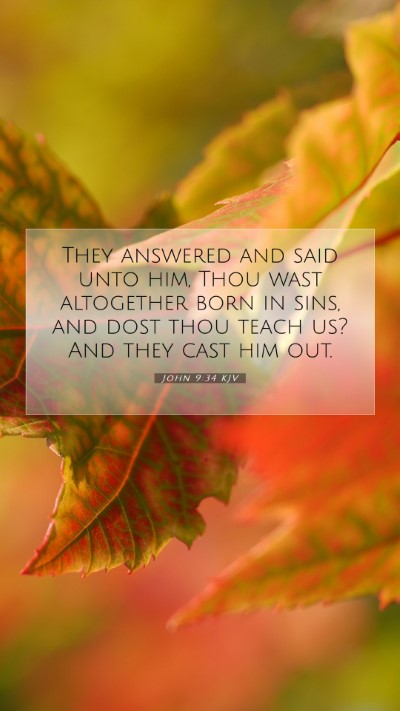Understanding John 9:34
John 9:34 states, "They answered and said unto him, Thou wast altogether born in sins, and dost thou teach us? And they cast him out." This verse showcases the confrontational attitude of the Pharisees toward the blind man who was healed by Jesus, encapsulating the tension between religious authority and the transformative power of Christ.
Contextual Background
In the Gospel of John, chapter 9 narrates the miraculous healing of a man who was born blind. This miracle serves as a profound illustration of both physical and spiritual blindness that affects humanity. The Pharisees, representing the established religious order, react with hostility to the miracle and the testimony of the healed man, showing their refusal to accept Jesus as the Messiah.
Verse Meaning and Commentary
-
Pharisaical Attitude:
Matthew Henry notes that the Pharisees' response is indicative of their moral and spiritual blindness. They attack the man for his testimony about Jesus, labeling him as sin or inferior because he was born blind, thus missing the point of what God had done.
-
Rejection of Truth:
Albert Barnes elaborates on the arrogance of the Pharisees when they dismiss the healed man's experience. Instead of recognizing the miracle, they prefer to cling to their traditions, showcasing a profound unwillingness to learn or perceive truths beyond their rigid beliefs.
-
Spiritual Implications:
Adam Clarke emphasizes the broader implications of this passage, suggesting that spiritual struggles often arise from ignorance and pride. The healed man represents those who are humble and receptive to divine truth, while the Pharisees symbolize obstinacy in the face of miraculous evidence.
In-Depth Analysis
This verse can be understood within several key themes:
- Human Limitation: The assertion from the Pharisees that the healed man must be void of authority because of his condition reveals a limited understanding of God's grace, which transcends human limitations.
- Authority of Jesus: The questioning of the man’s worthiness and authority because of sin directly contrasts with the message of Jesus, who seeks the lost and outcast, offering salvation regardless of societal judgment.
- Blindness to Truth: The irony of the situation is profound: the man who was physically blind now sees, while the spiritually elite are blind to their own shortcomings and the truth of Christ's message.
Application and Reflection
As we study this verse, it prompts us to consider our own attitudes toward those who possess different perspectives on faith and God’s works in their lives. Here are critical applications for personal and community Bible studies:
- How do we react when confronted with testimonies that challenge our beliefs?
- Are we open to understanding the transformative power of God’s work in others?
- In what ways might pride inhibit our spiritual growth and understanding of Scripture?
Cross References
This verse is related to several key scriptures that enhance its understanding:
- Matthew 15:14: "Let them alone: they be blind leaders of the blind. And if the blind lead the blind, both shall fall into the ditch."
- John 3:19: "And this is the condemnation, that light is come into the world, and men loved darkness rather than light, because their deeds were evil."
- Luke 18:9-14: The parable of the Pharisee and the tax collector illustrates contrasting attitudes in coming to God.
Conclusion
The insights from John 9:34 provide a rich field for biblical exegesis and understanding Scripture. This verse challenges readers to evaluate their own spiritual sight and the willingness to embrace truth, even when it defies personal or communal norms. In studying this passage, individuals and Bible study groups can cultivate a more profound understanding of the diversity of God’s grace and the call to humility in the spiritual journey.


